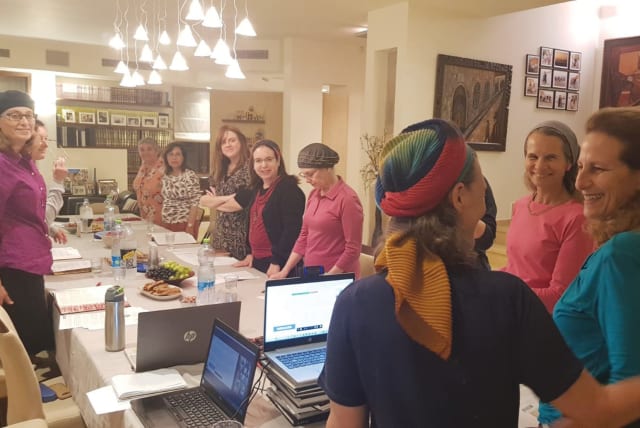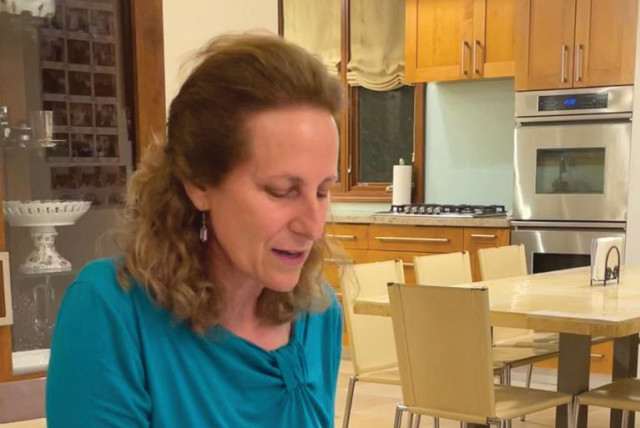Daf Yomi: Women study Talmud with Ra'anana rabbanit

Ten years ago, Michelle Farber started a daily Daf Yomi class in her home in Ra’anana. Her Daf Yomi podcast reaches more than 2,000 people worldwide.
The past decade has seen an upsurge in the study of Talmud by Jewish women.
Daf Yomi (“page of the day”) is a system of Talmud study inaugurated in 1920. The brainchild of Rabbi Moshe Menachem Mendel Spivak and World Agudath Israel, its aim is to invigorate the spirit of learning within the Jewish community and offer Jews all over the world a common topic to discuss.
The relatively intense study regime calls on adherents to study a single page of Talmud a day until completion of the entire 2,711 pages. This milestone, known as siyum haShas (“conclusion of Gemarra study”), ends a cycle of approximately seven and a half years. Across the globe, people study the same page each day.
This study method was quickly adopted among North American Jewish men. Today, tens of thousands learn daily, whether alone, in pairs or in larger study groups.
Rabbanit Michelle Farber, aware of the novel state of Talmud study, felt that women should be a part of it. With a strong background in Jewish texts and studies, she decided to apply her knowledge in this context.
Ten years ago, she started a daily Daf Yomi class in her home in Ra’anana, which is now online. Her Daf Yomi podcast (the only one led by a woman) in English and Hebrew reaches more than 2,000 people worldwide.
Completing the 7-year cycle of Daf Yomi: Judi Felber's story
One of Farber’s students, Judi Felber, who has benefited tremendously from adherence to the Daf schedule, told her story to the Magazine.
“Seven and a half years ago, I didn’t have a job and needed something to get me out of the house. Then I found Daf Yomi. It changed my life,” she said.
Felber is able to track her life through the cycle. Since starting, her daughter got married and she became a grandmother. Sadly, during that time, both her parents passed away. An aspect of the study group is the camaraderie, friendship and support surrounding it. For Felber, this was critical in challenging times.
When Felber’s father died, Farber was with her the whole time, and her Daf friends were there to help as well.
“They set everything up. It is such a strong community,” she said.
On December 13, 2018, her son Nathaniel, a soldier in the Netzah Yehuda battalion, was wounded in a shooting attack alongside two members of his unit, both of whom were killed.
“One day the army showed up, telling us to pack our bags and come immediately,” she said, describing finding out about her son’s condition.
At first, the doctors didn’t know if he would live. During the two and a half rough months in the hospital, her Daf Yomi community came to her aid.
Through all this, Felber kept learning every day – sometimes on her own – and completed her cycle on May 17.
About the siyum she said, “I was on such a high! I learned so, so much. Not just about Gemarra but about life and friendship in general.”
Felber is certain to keep learning, saying that “Some people need coffee. I need Daf.”
She added, “It enriched my appreciation of Judaism.”
FARBER’S CLASSES start at 7:15 a.m. every day and last for 45 minutes. For those who cannot tune in live, the class is posted online in podcast form shortly thereafter.
Her organization was started to further enrich the study of Jewish texts among women. It is called Hadran after the Hebrew word hadran, which is said at the conclusion of studying all the Talmud’s tractates. It means “go back to it.”
Before her podcast was initiated, Farber said, women had little chance of following a men’s class because it required that one have the necessary information and that one spoke “yeshivish.”
She pointed out that “most people say Talmud isn’t for women.” She has proven that this is not the case.
Prior to the last siyum haShas, Farber organized a large public celebration to promote Talmud study by women. She brought together the top scholars in the field, and in just one week 3,400 women registered, all of whom turned up at the International Convention Center.
“The very next day, women were signing up and learning,” she said.
Daf Yomi has gained traction in secular circles as well.
“It has opened doors to all sorts of people,” Farber said. “So many people doing Daf Yomi are not religious.”
This fits in with a larger trend in Israel where texts that were traditionally limited to more religious communities are finding a home among secular Israelis. While maintaining their secular identity and practice, they are nevertheless keen to uncover their past and learn the texts of their ancestors.
Farber is eager to bring more people into her circles to learn. Today, she has more than 50 WhatsApp groups with students from all over the world.
Asked why she thinks learning Talmud is important for women, she said it is “basic.”
“If you are Jewish, this is a basic text. It’s like learning math. No Jewish man would go through his education without learning Talmud; but in the women’s world, it wasn’t common. But there is no reason for that anymore.”
Farber expounded that the basis of all Jewish practice – Halacha – comes from the Talmud and that “any Jewish woman should be learning it.”
She said it is “crazy that a woman can be so educated – worldly and Jewishly – but have no knowledge of Talmud. The Torah springs into it, and everything else springs out of it.”
To get involved with Daf Yomi doesn’t mean you have to join at the beginning of the cycle. Most people join in the middle. For those who want to start, Farber said, “Start today.” For her, it is anchoring and sets the tone for the day.
Her classes, available on most podcast streaming platforms, go through the daily page of Talmud line by line, always trying to make it relevant to her students’ everyday lives, she explained.
She mentioned the difficulty that sometimes arises in more edgy pages that discuss women’s topics in a way that seems outdated.
“I always acknowledge that it’s difficult, and I try to explain it in a historical context, while also balancing it with a time when the rabbis were more forward-thinking… People don’t talk about the places where the rabbis protect and look out for women, which wasn’t common in that time of history.”
Farber pointed to a specific example of the laws of the ketubah, where the rabbis instituted a monetary element to disincentive divorce, in light of the negative reputation of divorcees in society at the time.
Not all of Farber’s students are women; she estimated that 20% are men. She basks in the incredible community that has grown from her classes, citing Felber as a prime example.
“You wouldn’t believe the power of the community,” she said, adding that even on Zoom her students feel like friends.
“People like to track their lives through the cycle. It gives you a sense of time, where you were when you started and finished,” Farber concluded, eager to guide more women on the journey of learning.
Jerusalem Post Store
`; document.getElementById("linkPremium").innerHTML = cont; var divWithLink = document.getElementById("premium-link"); if (divWithLink !== null && divWithLink !== 'undefined') { divWithLink.style.border = "solid 1px #cb0f3e"; divWithLink.style.textAlign = "center"; divWithLink.style.marginBottom = "15px"; divWithLink.style.marginTop = "15px"; divWithLink.style.width = "100%"; divWithLink.style.backgroundColor = "#122952"; divWithLink.style.color = "#ffffff"; divWithLink.style.lineHeight = "1.5"; } } (function (v, i) { });

